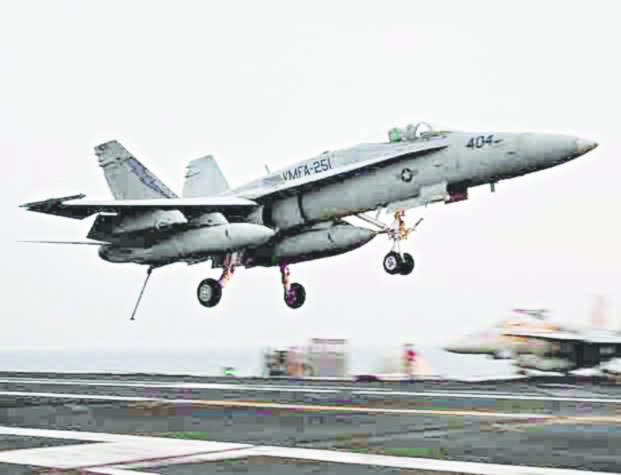
New Delhi, Oct. 19: The US has briefed India on possible "Freedom of Navigation" naval operations in the South China Sea and has brought back to the table the signing of three "foundational" documents to enhance military-to-military relations.
The US had also invited Prime Minister Narendra Modi and defence minister Manohar Parrikar to attend the Malabar naval exercises, which included Japan and ended today in the Bay of Bengal.
Modi was invited on board the USS Theodore Roosevelt aircraft carrier. The invite was required by protocol, one official said. Another said the Prime Minister was keen but his diary was full and the visit could not be accommodated.
The briefings to Indian officials have stopped short of an invitation to India to join with a US fleet in sailing close to or overflying three islands that satellite images have shown have been artificially built by China.
The waters of the South China Sea are contested by five nations around its rim. At stake for India is its right to operate its mercantile marine traffic in the east Pacific. Since 2012, US Pacific fleet warships traversing the South China Sea have deliberately sailed more than 12 nautical miles away from each of these islands to avoid a naval confrontation.
But the publicly declared intent for Freedom of Navigation (FoN) operations could mean that the US will dispute the territorial claims of China over these islands. Some of the islands in the Spratlys are also claimed by the Philippines, Malaysia and Vietnam.
US officials likewise also briefed Australia last week on possible FoN operations. But Australia has turned down possible partnership in patrolling the South China Sea with its warships and aircraft. Canberra has said it will give diplomatic encouragement to the FoN operations should the White House order it.
In talks with Indian officials, the Pentagon has said that India's refusal so far to sign a logistics support agreement, a basic exchange and cooperation agreement for geo-spatial cooperation and a communications interoperability and security memorandum of agreement was coming in the way of operationalising defence projects under a defence trade and technology initiative agreed by President Barack Obama and Modi.
In a speech and a question-answer session at Delhi's Institute for Defence Studies and Analyses in June 2012, then US secretary for defence, Leon Panetta, had said that Washington would stop insisting on the signing of the "foundational documents". Panetta's office has since been taken over by Ashton Carter, believed to be an India hand in the Pentagon.
US ambassador to India Richard Verma has stressed on the "transformation" of the military ties. "One of the most exciting developments... over the past eight months has been the transformation of the ties between the United States and Indian militaries,"
Verma said in a speech at the East West Center, a think tank in Hawaii, last month.
"Our defence industrial systems are now cooperating on the co-production of new technology that will be used by our respective armed forces. We are looking to make significant contributions to India's strategic capabilities, such as the anti-surface warfare capabilities of the Indian navy's submarine fleet," he said.Four submarines with the Indian Navy are being equipped with US made Harpoon missiles.
US officials are watching how the public debate in the US of sending warships near disputed islands of the South China plays out in India. They say India's Look East Policy was remarkably timed for the US "rebalance to the Asia Pacific" and the two policies are consistent. "We see a government in India that wants to go global," said one official. New Delhi's response to the FoN briefings is yet to be articulated. But the US will be studying Parrikar's statements at a scheduled meeting of eight Asian defence ministers scheduled next month.#










